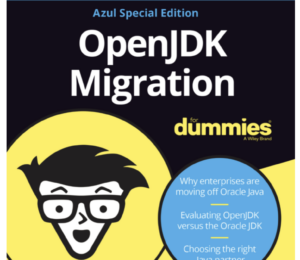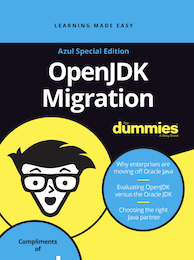Mastering the Challenges of OpenJDK Migration
- September 22, 2023
- 3412 Unique Views
- 2 min read
Ah, the halcyon days of Java development, where coding was king and APIs were the castle! From the nitty-gritty of the Java VM and garbage collection to the euphoria of leveraging new APIs, life was straightforward. With each Java update, you could expect nothing but improvements, a far cry from other ecosystems where every new version turned into a mini-project just to keep your codebase relevant. And with DevOps in the picture, version constraints felt like a thing of the past. Come 2017, Oracle promised us an accelerated release cycle, and life was good.
Insights on Enterprise Java: Current Trends, Challenges and Strategies
Register now for Insights on Enterprise Java: Current Trends, Challenges and Strategies on crowdcast, scheduled to go live on February 11, 2026, 02:30 PM GMT!
Register Here!
But then, the landscape began to shift. Starting with Java 10, APIs started disappearing, presenting a new challenge for developers. Then, in 2019, Oracle dropped the bombshell: commercial use of Java 8 would no longer be free. Oracle's changes and the subsequent tumult in the JDK universe made the future look darker.
Amidst all this, the global pandemic eclipsed our JDK concerns. But as we emerged, we were greeted yet again by changing license landscapes. The once-clear waters had turned murky; making an informed decision about your JDK distribution became a necessity. Keeping up with constant licensing changes is tiring, not to mention unproductive and this looks set to continue. Unless you enjoy this type of thing, in the words of Sweet Brown, “Ain't no one got time for that”.
As an aside, I once met a salesperson who proudly told me he had passed a Vendor Licensing exam. That’s right. The licensing was so complex they needed to send their salespeople for certification to be able to sell it. But, I digress. As a developer, the last thing one needs is audit and compliance knocking at the door and asking questions with spreadsheets and PowerPoint presentations. What one needs is a guide to this JDK complexity.
Enter Simon Ritter's "OpenJDK Migration for Dummies."
As a seasoned professional deeply involved in tech training and consulting, I found the book's technical chapters most enlightening. "Preparing for Your Migration" and "Migrating Your Applications" are veritable treasure troves of actionable advice. The appendices on JVM optimization and runtime security are not to be missed either.
However, the book's main focus is tackling the less glamorous but equally critical aspect of JDK management. It sets the stage for enterprises to evaluate not just the financial implications of their Java usage but also the inherent cybersecurity risks. The book’s checklists and migration plans are instrumental for any team tasked with navigating these muddy waters.
So, if you're in a Java-centric role—whether as a developer or a decision-maker—and need to confront the ever-evolving JDK landscape, Simon Ritter's book is the lighthouse guiding you safely to shore. It's an invaluable asset for making well-informed choices that benefit your business.
Don’t Forget to Share This Post!








Comments (0)
No comments yet. Be the first.